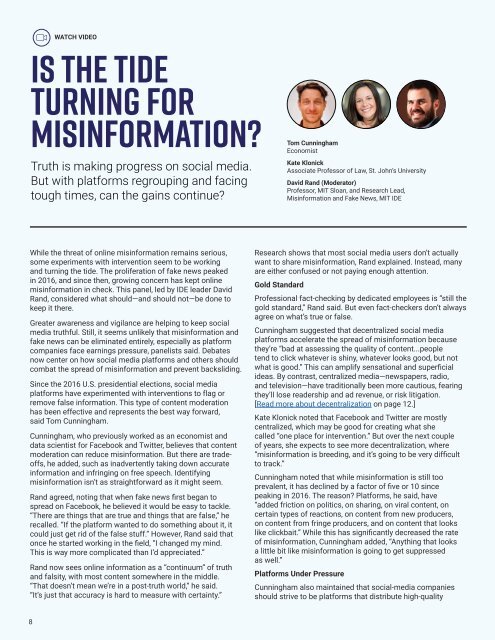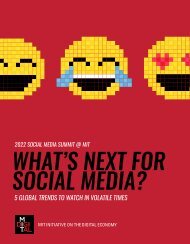The 2023 Social Media Summit@MIT Event Report
You also want an ePaper? Increase the reach of your titles
YUMPU automatically turns print PDFs into web optimized ePapers that Google loves.
WATCH VIDEO<br />
IS THE TIDE<br />
TURNING FOR<br />
MISINFORMATION?<br />
Truth is making progress on social media.<br />
But with platforms regrouping and facing<br />
tough times, can the gains continue?<br />
Tom Cunningham<br />
Economist<br />
Kate Klonick<br />
Associate Professor of Law, St. John’s University<br />
David Rand (Moderator)<br />
Professor, MIT Sloan, and Research Lead,<br />
Misinformation and Fake News, MIT IDE<br />
While the threat of online misinformation remains serious,<br />
some experiments with intervention seem to be working<br />
and turning the tide. <strong>The</strong> proliferation of fake news peaked<br />
in 2016, and since then, growing concern has kept online<br />
misinformation in check. This panel, led by IDE leader David<br />
Rand, considered what should—and should not—be done to<br />
keep it there.<br />
Greater awareness and vigilance are helping to keep social<br />
media truthful. Still, it seems unlikely that misinformation and<br />
fake news can be eliminated entirely, especially as platform<br />
companies face earnings pressure, panelists said. Debates<br />
now center on how social media platforms and others should<br />
combat the spread of misinformation and prevent backsliding.<br />
Since the 2016 U.S. presidential elections, social media<br />
platforms have experimented with interventions to flag or<br />
remove false information. This type of content moderation<br />
has been effective and represents the best way forward,<br />
said Tom Cunningham.<br />
Cunningham, who previously worked as an economist and<br />
data scientist for Facebook and Twitter, believes that content<br />
moderation can reduce misinformation. But there are tradeoffs,<br />
he added, such as inadvertently taking down accurate<br />
information and infringing on free speech. Identifying<br />
misinformation isn’t as straightforward as it might seem.<br />
Rand agreed, noting that when fake news first began to<br />
spread on Facebook, he believed it would be easy to tackle.<br />
“<strong>The</strong>re are things that are true and things that are false,” he<br />
recalled. “If the platform wanted to do something about it, it<br />
could just get rid of the false stuff.” However, Rand said that<br />
once he started working in the field, “I changed my mind.<br />
This is way more complicated than I’d appreciated.”<br />
Rand now sees online information as a “continuum” of truth<br />
and falsity, with most content somewhere in the middle.<br />
“That doesn’t mean we’re in a post-truth world,” he said.<br />
“It’s just that accuracy is hard to measure with certainty.”<br />
Research shows that most social media users don’t actually<br />
want to share misinformation, Rand explained. Instead, many<br />
are either confused or not paying enough attention.<br />
Gold Standard<br />
Professional fact-checking by dedicated employees is “still the<br />
gold standard,” Rand said. But even fact-checkers don’t always<br />
agree on what’s true or false.<br />
Cunningham suggested that decentralized social media<br />
platforms accelerate the spread of misinformation because<br />
they’re “bad at assessing the quality of content...people<br />
tend to click whatever is shiny, whatever looks good, but not<br />
what is good.” This can amplify sensational and superficial<br />
ideas. By contrast, centralized media—newspapers, radio,<br />
and television—have traditionally been more cautious, fearing<br />
they’ll lose readership and ad revenue, or risk litigation.<br />
[Read more about decentralization on page 12.]<br />
Kate Klonick noted that Facebook and Twitter are mostly<br />
centralized, which may be good for creating what she<br />
called “one place for intervention.” But over the next couple<br />
of years, she expects to see more decentralization, where<br />
“misinformation is breeding, and it’s going to be very difficult<br />
to track.”<br />
Cunningham noted that while misinformation is still too<br />
prevalent, it has declined by a factor of five or 10 since<br />
peaking in 2016. <strong>The</strong> reason? Platforms, he said, have<br />
“added friction on politics, on sharing, on viral content, on<br />
certain types of reactions, on content from new producers,<br />
on content from fringe producers, and on content that looks<br />
like clickbait.” While this has significantly decreased the rate<br />
of misinformation, Cunningham added, “Anything that looks<br />
a little bit like misinformation is going to get suppressed<br />
as well.”<br />
Platforms Under Pressure<br />
Cunningham also maintained that social-media companies<br />
should strive to be platforms that distribute high-quality<br />
“In a free society, the law does not necessarily have a<br />
role to play in trying to determine truth.”<br />
Kate Klonick<br />
Associate Professor of Law, St. John’s University<br />
content, not just platforms that maximize retention, likes, and<br />
time spent. And yet, in the current cost-cutting environment,<br />
many social media companies have been laying off their<br />
ethicists and fact-checkers.<br />
Klonick said that while “lots of work has been done to raise<br />
awareness about malicious actors and misinformation,” the<br />
tradeoff may be increased public skepticism about what is<br />
or is not fake news.<br />
She doubts that legal interventions will help to clarify online<br />
truth. “One of the very unpopular things that I have said over<br />
the last five years, but I think is ultimately true, is that in a<br />
free society, the law does not necessarily have a role to play<br />
in trying to determine truth,” Klonick explained.<br />
Sometimes, she added, it’s best to let the private sector be<br />
the gatekeepers. Platforms know how to create friction and<br />
slow things down. “Markets,” Klonick said, “respond faster<br />
than the law to changing norms.”<br />
For these reasons and more, Klonick doesn’t see legislative<br />
remedies coming to the rescue anytime soon. Policy<br />
proposals, she said, are “a disincentive, a stick...but they’re<br />
not that helpful.” What’s more, she said, substantial bans on<br />
certain types of content, based on subjective judgments, are<br />
“not going to be in line with First Amendment principles at all.”<br />
<strong>The</strong> Cost of Regulation<br />
In many countries, social media platforms already comply<br />
with content regulations, Cunningham noted. Much of that<br />
content would be removed anyway, he said: “<strong>The</strong>y’re going<br />
to take down terrorist stuff, child porn; they’re going to take<br />
down hate speech.”<br />
Before the current layoffs, platforms were aggressively<br />
addressing the problem. <strong>The</strong>y were spending 5% of their<br />
overall costs on data scientists, content raters, and different<br />
structures for moderating content, Cunningham said, even<br />
when they were not legally required to do so. <strong>The</strong> reason<br />
wasn’t altruism or free speech, but pressure from advertisers.<br />
Cunningham isn’t confident that most platform companies<br />
“have a super-clear North Star; they’re responsive to half a<br />
dozen different constituencies.” Those include the media,<br />
governments, advertisers, users, employees, and investors.<br />
“All of those,” Cunningham added, “have very strong opinions<br />
about what content should be on the platform.”<br />
Ideally, social media platforms will discover new ways to keep<br />
the good content while eliminating the bad. But, Cunningham<br />
warned, “I don’t think that we should be crossing our fingers<br />
for that business model in the very short term.”<br />
8<br />
9
















